Law (179 found)
Comparing States’ treatment of businesses and associations worldwide
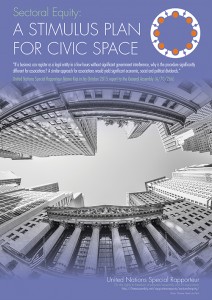 In this report, Maina Kiai’s third to the United Nations General Assembly, the Special Rapporteur compares the enabling environments that States, multilateral organizations and other actors create for businesses and associations, and highlights instances where they are treated inequitably.
In this report, Maina Kiai’s third to the United Nations General Assembly, the Special Rapporteur compares the enabling environments that States, multilateral organizations and other actors create for businesses and associations, and highlights instances where they are treated inequitably.
Submission to the United Nations Universal Periodic Review on Refugees and Displaced Persons Burma/Myanmar
1. This submission focuses on Burma’s compliance with international human rights obligations in relation to Burma’s refugees and displaced persons safe, dignified and voluntary return. It draws on interviews conducted with a mixture of semi-structured individual interviews and focus groups with refugees from Mae La, Umpiem Mai, Ban Nai Soi, and Mae Ra Ma Luang refugee camps including women, youth and religious minority groups, Mon, Karenni, and Karen civil society groups, ethnic armed groups (EAGs), refugee committees, and international non-governmental organizations […]
• • •JADE: Myanmar’s “Big State Secret”
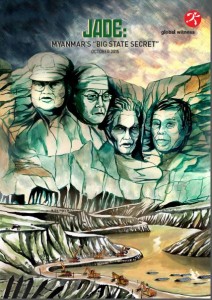 Since 2011, Myanmar’s rebranded government has told the world it is transitioning from a pariah state run by a ruthless military dictatorship to a civilian regime committed to wholesale political and economic reforms […]
Since 2011, Myanmar’s rebranded government has told the world it is transitioning from a pariah state run by a ruthless military dictatorship to a civilian regime committed to wholesale political and economic reforms […]
Myanmar: National report submitted in accordance with paragraph 5 of the annex to Human Rights Council resolution 16/21
1. During the First Cycle of UPR, the promotion and protection of human rights in Myanmar was reviewed on 27 January 2011 at the meeting of the Working Group on UPR […]
• • •Southeast Asia: Deadly Journeys – The Refugee and Trafficking Crisis in Southeast Asia
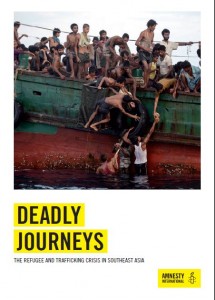 In May 2015 three boats carrying 1,800 women, men and children landed in Aceh, Indonesia. Most of the passengers were Muslim Rohingya, a persecuted religious and ethnic minority from Myanmar […]
In May 2015 three boats carrying 1,800 women, men and children landed in Aceh, Indonesia. Most of the passengers were Muslim Rohingya, a persecuted religious and ethnic minority from Myanmar […]
Report on Repressive Laws in Burma
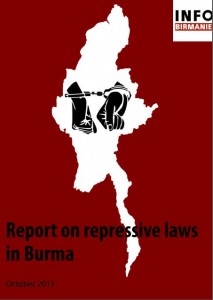 In spite of the reforms in Burma in recent years, the process of democratization has been called into question by the persistence of grave human rights violations and the absence of any significant progress on genuine democractic reforms, notably with regard to the process of legal reform […]
In spite of the reforms in Burma in recent years, the process of democratization has been called into question by the persistence of grave human rights violations and the absence of any significant progress on genuine democractic reforms, notably with regard to the process of legal reform […]
Disenfranchisement and Desperation in Myanmar’s Rakhine State: Drivers of a Regional Crisis
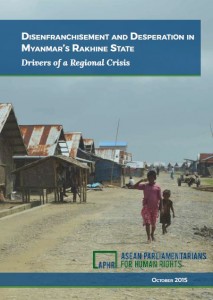 Political exclusion is exacerbating the already intense sense of desperation among Rohingya Muslims in Myanmar’s Rakhine State, and driving a regional crisis that ASEAN leaders are ill prepared to confront. Unless serious steps are taken to address the situation of deprivation and despair in Rakhine State, many Rohingya will have no other option but to flee in search of asylum elsewhere […]
Political exclusion is exacerbating the already intense sense of desperation among Rohingya Muslims in Myanmar’s Rakhine State, and driving a regional crisis that ASEAN leaders are ill prepared to confront. Unless serious steps are taken to address the situation of deprivation and despair in Rakhine State, many Rohingya will have no other option but to flee in search of asylum elsewhere […]
Burma: International Religious Freedom Report for 2014
Muslim, Christian, and other religious minorities faced physical abuse, arbitrary arrest and detention, restrictions on religious practice and travel, and discrimination in employment and access to citizenship […]
• • •Crackdown at Letpadan: Excessive Use of Force and Violations of the Rights to Freedom of Peaceful Assembly and Expression in Letpadan, Bago Region, Myanmar
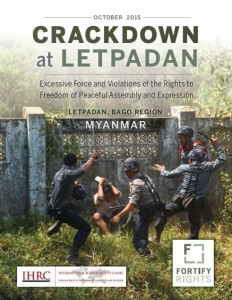 On March 10, 2015, following a weeklong standoff in the town of Letpadan in Myanmar’sBago Region, police officers violently cracked down on a group of approximately 200 protesters demonstrating against the recently passed National Education Law […]
On March 10, 2015, following a weeklong standoff in the town of Letpadan in Myanmar’sBago Region, police officers violently cracked down on a group of approximately 200 protesters demonstrating against the recently passed National Education Law […]
‘Going back to the old ways’: A new generation of prisoners of conscience in Myanmar
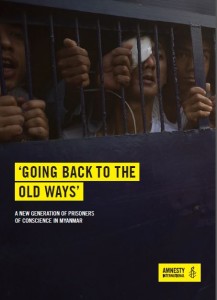 A new Amnesty International briefing – ‘Back to the old ways’ – exposes how repression has drastically picked up pace over the past two years, in stark contrast to official claims that not a single person is imprisoned for peacefully exercising their rights […]
A new Amnesty International briefing – ‘Back to the old ways’ – exposes how repression has drastically picked up pace over the past two years, in stark contrast to official claims that not a single person is imprisoned for peacefully exercising their rights […]

 All posts
All posts